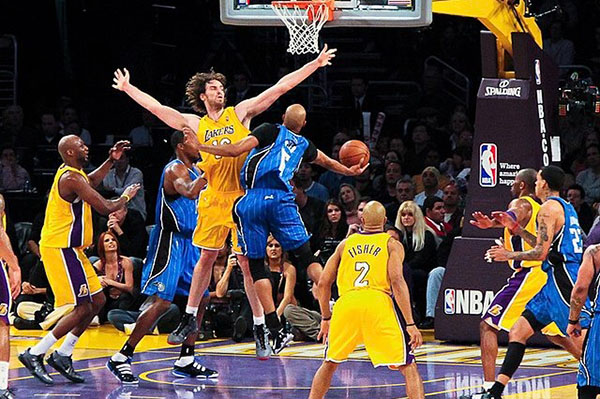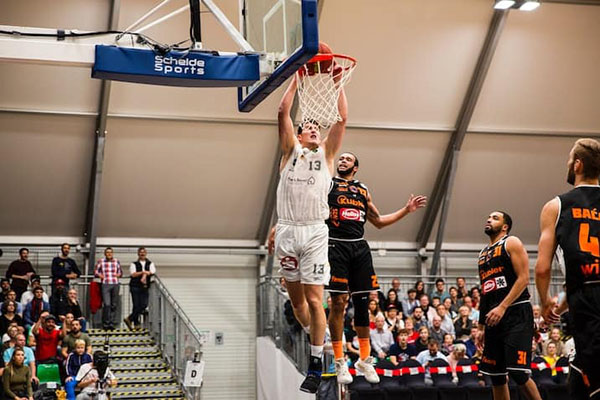Can basketball make you taller? It’s a question that has intrigued many, and the answers have been anything but straightforward. While we are well aware that genetics play a significant role in determining our height, recent research has suggested that there might be an intriguing connection between playing basketball and a person’s stature.
In this quest to unravel the truth, scientists have embarked on a journey to explore the potential link between basketball and height. While it’s not a guarantee that shooting hoops will suddenly transform you into a towering giant, there are compelling reasons to delve deeper into this fascinating relationship.
Are you curious to uncover the mysteries surrounding the impact of basketball on one’s height? Join us on this enlightening journey as we dive into the science behind this age-old debate.
Does playing basketball increase your height?
To date, scientific research has not provided conclusive evidence to suggest that playing basketball or engaging in any specific form of exercise directly contributes to a significant increase in one’s maximum height. However, it’s important to note that this doesn’t diminish the numerous advantages that basketball offers individuals of all ages.
Basketball is not only a fun and exciting sport but also provides a wide range of physical and mental benefits. While it may not make you taller, it can certainly help you in other aspects of your well-being.

For Kids:
Engaging in basketball can potentially aid in height development for children. While this statement may sound a bit perplexing, there is indeed a positive impact of this sport, specifically for kids.
Playing basketball can stimulate the growth of bones in children’s feet and ankles. This not only results in larger calf muscles but also accelerates bone growth at a faster rate than usual. Additionally, participating in basketball can enhance their vertical leap and balance, both of which are essential for jumping. It’s worth noting, however, that these benefits are most effective for younger players and may not apply to those beyond the age of 25.
For Adults:
The scenario changes significantly for adults.
Adults have already reached their full height, and their growth plates are fused, meaning they will not experience any further growth. Prolonged participation in basketball among adults can potentially have adverse effects on their cartilage and even lead to a loss of their current height.
So, Should You Play Basketball?
Absolutely, yes! Basketball is an excellent way to maintain a healthy and active lifestyle while also enhancing essential skills such as balance and jumping ability. However, for adults, it is advisable to engage in the sport for shorter periods to avoid any risk of height loss.
What is a good age to start playing basketball?
When it comes to determining the ideal age to begin one’s basketball journey, it’s essential to consider various factors that contribute to a child’s development in the sport. Typically, children as young as five to six years old can embark on their basketball adventure by enrolling in introductory programs. This age range is particularly conducive to laying the foundation for fundamental basketball skills while igniting their passion for the game.
Between the ages of seven and nine, young players can progress to a more structured and rule-based understanding of basketball. During this phase, they can delve deeper into the intricacies of the game, honing their abilities and teamwork skills. As they approach the age of ten, these budding athletes will have acquired the necessary skills and knowledge to engage in competitive play against other teams, marking an exciting milestone in their basketball journey.
It’s important to remember that the right age to start playing basketball may vary from child to child, as individual interests, physical development, and readiness can differ significantly. Therefore, parents and coaches should closely observe and support young athletes, allowing them to discover their passion for basketball at their own pace while fostering a love for the sport that will last a lifetime.
What actions make you grow taller while playing basketball?

Running
Running is an essential component of basketball, whether you’re sprinting up and down the court with the ball or making swift movements without it. This high-intensity cardiovascular exercise serves as a primary trigger for the release of Human Growth Hormone (HGH), a crucial factor in the process of increasing one’s height.
Jumping
Jumping plays a pivotal role in basketball, be it when attempting a layup or reaching for a rebound. When you leap into the air, your body undergoes a stretching motion, which can contribute to the lengthening of your limbs. Moreover, as you descend back to the ground, gravity exerts pressure on your body, leading to increased blood flow to your growth plates. This enhanced blood circulation may direct additional growth hormones towards these plates, ultimately aiding in the vertical growth of your body.
Shooting and Dribbling
The actions involved in shooting, which entail jumping and extending your arm to its maximum reach, actively engage and stretch your arms and spine, potentially facilitating height growth. Additionally, dribbling, a fundamental skill in basketball, stimulates the production of HGH since it requires the coordinated use of both hands rather than relying solely on your dominant hand.
Dunking
Dunking, the art of jumping up to the basket, controlling the ball, and depositing it into the hoop, is not only a display of skill but also an effective exercise for increasing your height potential. Dunking enhances your overall stamina and significantly contributes to your vertical development.
Collecting Rebounds
Rebounding, an integral part of basketball gameplay, demands impressive vertical leaps to secure the ball. This action serves as an excellent workout for your entire body, including your height, as it involves repeated, high-intensity jumps that contribute to the overall development of your physique.
What should you do when playing basketball to increase your height?
Basketball alone does not make you grow taller for sure. There are some things you should follow to encourage growth and promote your overall health.
Have a well-planned training schedule
Professional players always stick to an intensive training plan to help them improve their skills and maintain their overall health. Meanwhile, most players regularly train to help promote muscle health and boost muscle mass, thereby improving their physical strength and performance.
Do lots of exercises
Exercise plays a pivotal role in promoting growth, as it facilitates the release of Human Growth Hormone (HGH) and enhances bone density. The more consistently you incorporate exercise into your routine, the greater the potential for favorable results. Here are several exercises that you should include in your regular regimen to improve your basketball skills and promote growth:
Front Squat
The front squat is an effective compound exercise that targets multiple muscle groups, including the legs and core. It not only strengthens your lower body but also contributes to overall growth stimulation.
Lateral Lunge
Lateral lunges help improve agility and flexibility while engaging the muscles of your legs and hips. This exercise enhances your ability to move laterally on the basketball court.
Side Plank Leg Raise
Side plank leg raises focus on your core strength and hip stability, which are essential for balance and agility during basketball play.
Split Squat Jumps
Split squat jumps are a dynamic plyometric exercise that boosts lower body power and explosiveness, valuable attributes in basketball. They also contribute to height growth by promoting the release of HGH.
Glute Bridge
The glute bridge exercise strengthens your glutes and lower back, which are crucial for maintaining proper posture and balance on the court. Improved posture can help you appear taller.
Pullups
Pullups are an excellent upper body exercise that enhances your arm and back strength. A strong upper body can aid in shooting accuracy and defensive maneuvers in basketball.
Single-Leg Hurdle Hop
This exercise improves single-leg stability and coordination, valuable skills for maneuvering on the basketball court while also stimulating growth through repetitive jumping.
Line Hops
Line hops enhance agility and quick footwork, which are essential for evading opponents and navigating the court effectively.
Fingertip Push-Ups
Fingertip push-ups strengthen your hand and finger muscles, enhancing your ball-handling skills in basketball. Improved control over the ball can lead to better performance.
Squat Hops to Wall Squat
Squat hops to wall squat is a dynamic exercise that combines squats and wall sits, targeting leg strength and endurance. It aids in both explosive movements and sustaining a low defensive stance on the court.

Get proper nutrition
A healthy diet also plays a necessary factor in supporting growth. A well-balanced diet that is rich in protein, calcium, and vitamin D will help you meet your goals while playing basketball. While protein boosts muscle growth, vitamin D and calcium contribute to bone health. Also, a high carbohydrate diet is suggested for basketball players.
You can consult here to get a detailed list of what to eat. At once, try to avoid extra amounts of unhealthy foods, such as caffeine, alcohol, soda, smoking, etc.
Sleep well
Getting a good night’s sleep is not just about feeling rested; it can significantly impact your physical performance and overall well-being. When you push your body to its limits, such as during intense physical activity like basketball, the quality of your sleep becomes even more important.
Sleeping well is a crucial component of your body’s recovery and growth process. It allows your muscles to repair and regenerate, making you more capable on the basketball court. But how much sleep do you really need?
For children aged 6 to 12 years, it’s recommended that they get between 9 to 12 hours of sleep every night. Teenagers, who are still in a phase of rapid growth and development, should aim for 8 to 10 hours of sleep. As for adults, 7 to 9 hours of quality sleep is the ideal range
Add supplements
While dietary supplements can be beneficial for certain aspects of health, they are not a magic solution to make children grow taller or prevent height loss in adults. It’s essential to approach supplements with caution and under the guidance of a healthcare professional.
For example, if you have a medical condition that impairs your body’s ability to produce Human Growth Hormone (HGH), your doctor may recommend a supplement to help stimulate HGH production. However, it’s crucial to note that once your growth plates have closed after puberty, there is no supplement or method that can significantly increase your height.
Wrapping up
Engaging in solo basketball practice alone may not directly lead to an increase in height. However, when you incorporate consistent basketball practice with the strategies mentioned earlier, you can potentially support and promote healthy growth and development.
What are your thoughts on this? Feel free to share your opinions below!
- Related post: Do Height Growth Pills Work?



